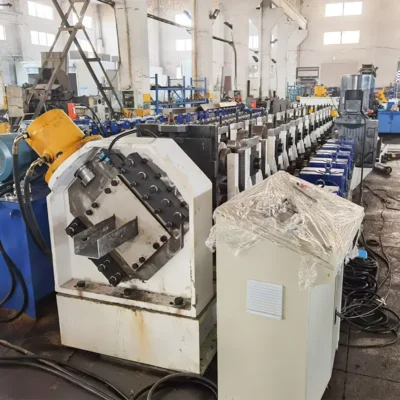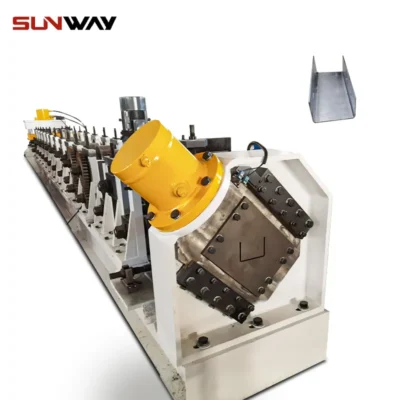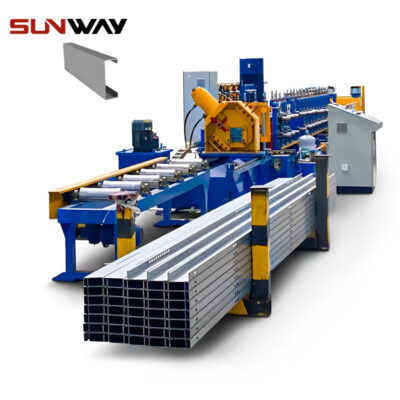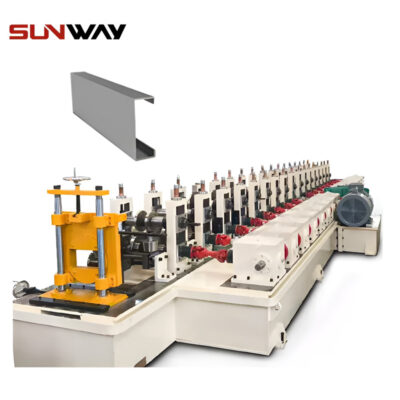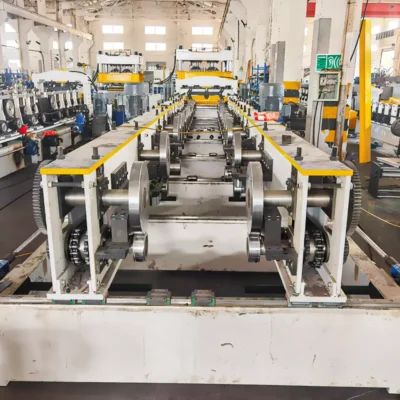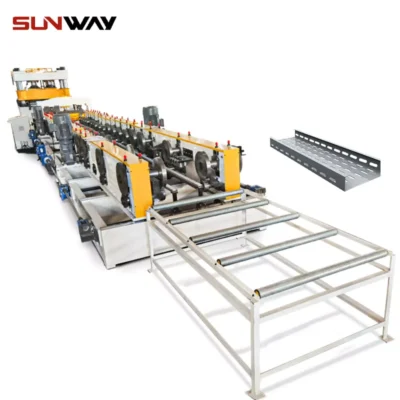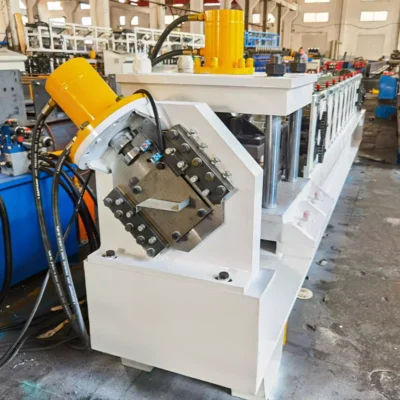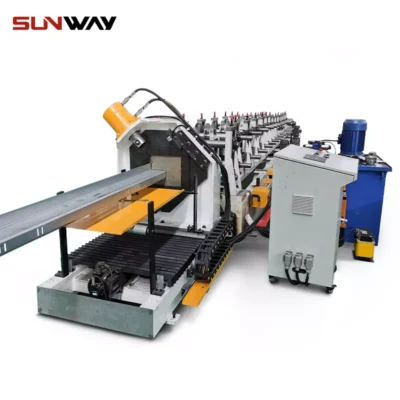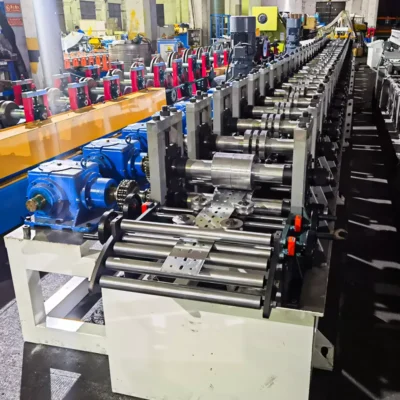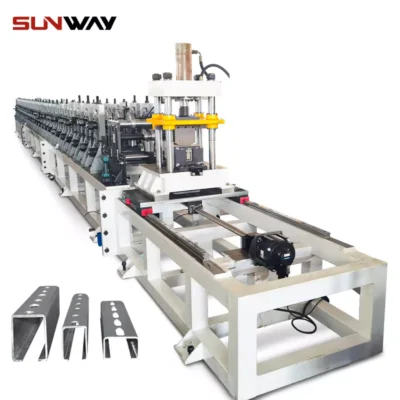In today’s world, the demand for high-quality and energy-efficient home appliances is ever-growing. From refrigerators to washing machines and air conditioners, consumers expect durability, precision, and sleek designs. Behind the scenes, the manufacturing of these products relies heavily on Home Appliance Roll Forming Machines, which enable manufacturers to produce precise, durable, and aesthetically pleasing metal components at scale.
These machines are engineered to create critical parts for home appliances, such as inner and outer panels, structural frames, and decorative trims. By automating the process of shaping metal sheets into the desired profiles, roll-forming machines ensure consistency, reduce waste, and improve production efficiency—all while lowering costs.
This guide dives deep into applications, features, production workflows, pricing, market trends, and innovations related to Home Appliance Roll Forming Machines. We’ll also highlight why Wuxi Sunway Machinery has become a top choice for manufacturers in this sector.
What is a Home Appliance Roll Forming Machine?
A Home Appliance Roll Forming Machine is a specialized industrial system designed to shape metal sheets or coils into precise components used in the manufacturing of home appliances. These machines are integral to producing various parts that form the structure, functionality, and aesthetic of everyday household devices.
Components Produced by Home Appliance Roll Forming Machines
- Structural Frames: For washing machines, dryers, and refrigerators.
- Panels: Inner and outer panels for appliances like dishwashers and ovens.
- Decorative Trims: Sleek edges and trims for aesthetic appeal.
- Control Panel Frames: Housings for operational interfaces like control buttons or touchscreens.
- Specialized Profiles: Custom profiles for unique appliance designs.
By automating the production of these components, roll-forming machines help manufacturers efficiently meet the growing demand for home appliances without compromising on quality or design.
Applications of Home Appliance Roll Forming Machines
The versatility of Home Appliance Roll Forming Machines allows them to cater to a wide range of applications in the home appliance industry. Here’s how these machines make an impact:
1. Refrigerators
- Use Case: Producing inner and outer panels, door frames, and structural reinforcements.
- Why It Matters: Ensures durability, energy efficiency, and a polished aesthetic for modern refrigerators.
2. Washing Machines and Dryers
- Use Case: Manufacturing the drum housing, base frames, and outer shells.
- Why It’s Crucial: Provides structural integrity to withstand vibrations and ensures a sleek finish.
3. Air Conditioners
- Use Case: Crafting metal panels for indoor and outdoor units, as well as frames for control panels.
- Why It’s Important: Offers corrosion-resistant profiles to ensure longevity in varying environmental conditions.
4. Dishwashers
- Use Case: Producing inner tubs, door frames, and control panel trims.
- Why It’s Relevant: Ensures water-resistant and durable components that can withstand high temperatures.
5. Ovens and Microwaves
- Use Case: Manufacturing internal linings, outer casings, and decorative trims.
- Why It’s Useful: Balances functionality with aesthetic appeal to meet consumer preferences.
6. Small Appliances
- Use Case: Creating metal profiles for coffee machines, toasters, and blenders.
- Why It’s Exciting: Enables innovative designs for compact and portable appliances.
Key Features of Wuxi Sunway Home Appliance Roll Forming Machines
Wuxi Sunway Machinery has revolutionized roll-forming technology for home appliance manufacturing. Their machines are loaded with advanced features that ensure precision, efficiency, and durability. Here’s what makes them stand out:
1. Multi-Profile Capabilities
- What It Supports: Machines can produce a variety of profiles, such as panels, trims, and structural frames.
- Why It’s Beneficial: Allows manufacturers to serve diverse appliance categories using a single machine.
2. High-Speed Production
- Performance: Capable of producing up to 30–50 meters of profiles per minute, depending on material and complexity.
- Why It’s Relevant: Meets the high-volume demands of the home appliance industry.
3. Material Versatility
- Supported Materials:
- Stainless steel
- Galvanized steel
- Aluminum
- Why It Matters: Ensures compatibility with materials that balance durability, weight, and corrosion resistance.
4. Precision and Consistency
- What It Provides: Dimensional accuracy with tolerances as low as ±0.1mm.
- Why It’s Crucial: Ensures perfect fitting of components for seamless assembly in home appliances.
5. Integrated Cutting and Punching
- What It Offers: Built-in systems for creating vents, holes, or custom designs.
- Why It’s Important:
- Eliminates the need for secondary operations.
- Reduces production time and labor costs.
6. Customizable Tooling
- What It Allows: Quick-change tooling for producing custom profiles tailored to unique appliance designs.
- Why It’s Valuable: Supports innovation and flexibility for manufacturers in competitive markets.
7. IoT and Automation Integration
- What It Enables: Real-time monitoring, automated adjustments, and error detection using IoT-enabled systems.
- Why It’s Game-Changing:
- Enhances production efficiency.
- Minimizes downtime and material waste.
- Provides actionable insights for predictive maintenance.
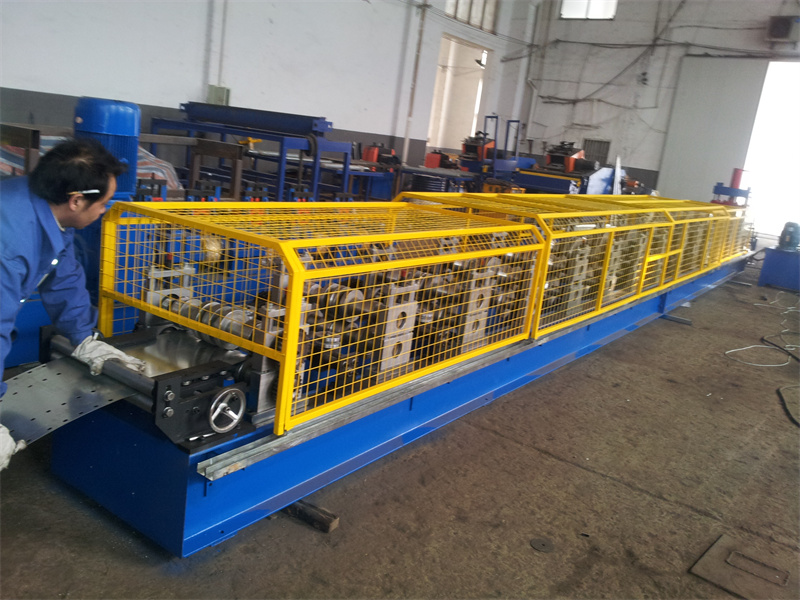
Production Workflow of a Home Appliance Roll Forming Machine
The production process for home appliance components is streamlined and efficient, ensuring high-quality output at every stage. Here’s a step-by-step overview:
1. Material Loading
- Metal sheets or coils are fed into the machine’s decoiler, which prepares the material for processing.
2. Straightening
- A leveling system ensures the material is flat and defect-free before entering the roll-forming section.
3. Roll Forming
- The material passes through a series of rollers that shape it into the desired profile.
4. Punching and Cutting
- Integrated systems create holes, vents, or slots and cut profiles to precise lengths.
5. Quality Inspection
- Components are inspected for dimensional accuracy, surface finish, and compliance with appliance design standards.
6. Stacking and Packaging
- Finished components are stacked and packaged for transportation to assembly lines or storage facilities.
Pricing of Home Appliance Roll Forming Machines
The cost of a Home Appliance Roll Forming Machine depends on its features, production capacity, and customization options. Below is a general pricing guide for 2025:
| Machine Type | Capabilities | Price Range (USD) |
|---|---|---|
| Standard Machines | Basic profile production | $120,000–$200,000 |
| Advanced Machines | High-speed and multi-profile output | $200,000–$350,000 |
| Customizable Machines | Including punching, IoT, and automation | $350,000–$600,000 |
For detailed pricing and financing options, contact Wuxi Sunway Machinery.
Technological Advancements in Home Appliance Roll Forming Machines
The home appliance industry is at the forefront of innovation, and Home Appliance Roll Forming Machines are evolving to meet these demands. Here are some recent advancements:
1. AI-Driven Quality Control
- What It Does: AI systems monitor production in real-time to detect defects or inconsistencies.
- Why It’s Critical:
- Ensures consistent quality across all components.
- Reduces material waste by addressing issues early.
2. Modular Tooling Systems
- What It Enables: Quick changes between tooling setups for different profiles.
- Why It’s Practical:
- Supports both high-volume production and custom orders.
- Reduces setup time, improving operational efficiency.
3. Energy-Efficient Operations
- What It Provides: Machines equipped with energy-saving motors and optimized workflows.
- Why It’s Sustainable:
- Lowers electricity consumption during production.
- Aligns with eco-friendly manufacturing goals.
4. Digital Twin Technology
- What It Offers: Virtual simulations of the roll-forming process to optimize machine settings.
- Why It’s Game-Changing:
- Speeds up setup for new profiles.
- Enables manufacturers to test designs virtually before physical production.
FAQs About Home Appliance Roll Forming Machines
| Question | Answer |
|---|---|
| Can these machines produce decorative trims? | Yes, Wuxi Sunway machines are designed to create a variety of aesthetic profiles for appliances. |
| What materials are compatible with these machines? | Stainless steel, galvanized steel, and aluminum are commonly used. |
| What is the average production speed? | Machines can produce up to 30–50 meters per minute, depending on material and complexity. |
| Do these machines support custom designs? | Absolutely! Customizable tooling allows for bespoke profiles tailored to specific appliance designs. |
| Are these machines energy-efficient? | Yes, Wuxi Sunway machines are equipped with energy-saving motors and optimized workflows. |
| What is the typical machine lifespan? | With proper maintenance, these machines last 15–25 years or more. |
Market Trends for Home Appliance Roll Forming Machines in 2025
The home appliance industry is undergoing rapid transformation, driven by technology advancements, consumer preferences, and environmental regulations. Here are the key market trends shaping the adoption of Home Appliance Roll Forming Machines:
1. Rising Demand for Energy-Efficient Appliances
- The Trend: As consumers prioritize sustainability, manufacturers are producing appliances that consume less energy and use eco-friendly materials.
- How Roll Forming Helps:
- Machines process lightweight yet durable materials, reducing overall energy consumption in appliances.
- Produces precise components that enhance energy efficiency through better insulation and performance.
2. Shift Toward Smart Appliances
- The Push: The Internet of Things (IoT) is driving the adoption of smart appliances with advanced functionalities and sleek designs.
- Why It Matters:
- Roll-forming machines enable the production of customized profiles for smart appliance housings and control panels.
- Supports innovative designs that integrate seamlessly with modern home aesthetics.
3. Growth in Modular Appliance Designs
- The Opportunity: Modular appliances, which allow users to upgrade or replace specific components, are gaining popularity.
- Machine Contribution:
- Machines produce interchangeable panels and frames for modular systems.
- Promotes sustainability by reducing waste and extending product lifespans.
4. Expansion in Emerging Markets
- The Trend: Rising incomes and urbanization in developing regions are driving the demand for affordable home appliances.
- How Roll Forming Helps:
- Cost-effective production capabilities make appliances more affordable for consumers.
- High-speed production ensures manufacturers can meet growing demand in these regions.
5. Increased Focus on Sustainability
- The Push: Governments and organizations worldwide are implementing stricter environmental regulations.
- Why It’s Relevant:
- Machines support eco-friendly manufacturing by reducing material waste and processing recyclable metals.
- Energy-efficient operations align with green manufacturing goals.
Sustainability Advantages of Home Appliance Roll Forming Machines
As sustainability becomes a top priority across industries, Home Appliance Roll Forming Machines are playing a critical role in reducing the environmental impact of appliance manufacturing. Here’s how:
1. Reduced Material Waste
- The Feature: Precision rollers shape materials with minimal scrap.
- Why It Matters:
- Conserves raw materials, reducing the environmental footprint of production.
- Lowers material costs for manufacturers.
2. Support for Recyclable Materials
- What It Enables: Machines process recyclable materials such as stainless steel and aluminum.
- Environmental Impact:
- Promotes the circular economy by enabling material reuse.
- Reduces dependency on non-renewable resources.
3. Energy-Efficient Operations
- The Innovation: Machines are equipped with energy-saving motors and optimized workflows.
- Why It’s Significant:
- Lowers electricity consumption during production.
- Aligns with sustainability goals in appliance manufacturing.
4. Durable and Long-Lasting Components
- The Result: Components produced by roll-forming machines are highly durable and resistant to wear and tear.
- Why It’s Sustainable:
- Extends the lifespan of appliances, reducing waste from frequent repairs or replacements.
- Enhances overall product quality, minimizing returns and defects.
5. Modular Manufacturing
- The Contribution: Machines produce interchangeable parts for modular appliances.
- Why It’s Important:
- Supports repairability and upgrades, reducing electronic waste.
- Encourages consumers to keep appliances longer, promoting sustainability.
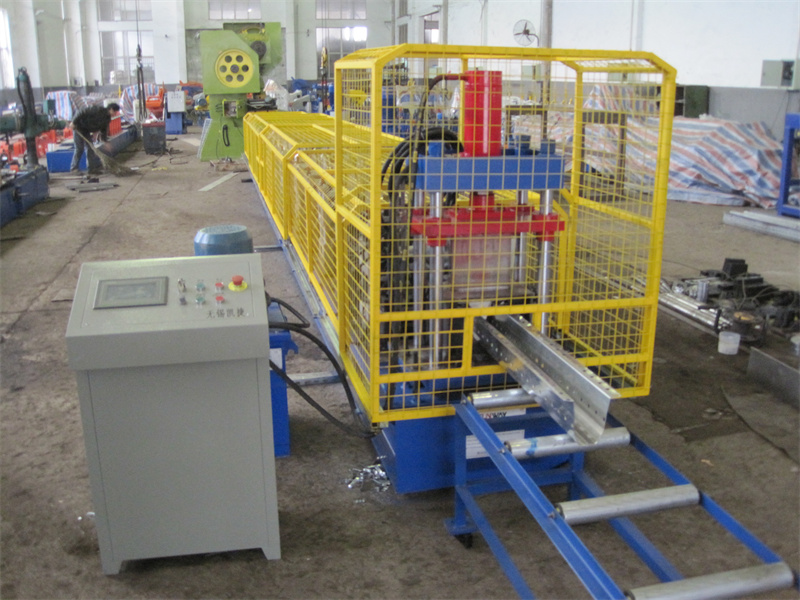
Real-World Applications of Home Appliance Roll Forming Machines
To truly understand the impact of Home Appliance Roll Forming Machines, let’s look at some real-world scenarios where these machines are making a difference:
1. Manufacturing Smart Refrigerators
- Scenario: A global appliance brand is developing a new line of smart refrigerators with advanced cooling technology and elegant designs.
- Machine Contribution:
- Produces sleek outer panels and robust inner linings.
- Crafts control panel frames for touchscreens and digital displays.
- Ensures precision to support energy-efficient insulation.
2. Producing High-Efficiency Air Conditioners
- Scenario: An HVAC company is expanding its product line to include energy-efficient air conditioners for urban households.
- Machine Contribution:
- Crafts corrosion-resistant panels for outdoor units.
- Produces lightweight frames for indoor units, enhancing ease of installation.
- Supports customizable designs to meet varying climate conditions.
3. Building Modular Washing Machines
- Scenario: A startup focused on sustainability is developing modular washing machines that allow users to replace parts instead of buying new appliances.
- Machine Contribution:
- Produces interchangeable frames and panels.
- Ensures compatibility across components for seamless assembly.
- Reduces costs, making modular designs more accessible to consumers.
4. Crafting Modern Ovens and Microwaves
- Scenario: A home appliance manufacturer is launching a premium line of ovens and microwaves with a focus on design and functionality.
- Machine Contribution:
- Creates highly aesthetic trims for a polished look.
- Produces durable inner linings to withstand high temperatures.
- Supports innovation in compact designs for smaller kitchens.
Expanded FAQ Section for Home Appliance Roll Forming Machines
| Question | Answer |
|---|---|
| What is the typical lead time for machine delivery? | Lead times range from 6–12 weeks, depending on customization requirements. |
| Are these machines compatible with stainless steel? | Yes, Wuxi Sunway machines are designed to process stainless steel, aluminum, and galvanized steel. |
| Can these machines produce custom profiles? | Absolutely! Customizable tooling allows for bespoke designs tailored to specific appliance models. |
| What is the average production speed? | Machines can produce up to 30–50 meters of profiles per minute, depending on material and complexity. |
| Do these machines include integrated punching? | Yes, integrated punching systems are standard, enabling the creation of vents, holes, and slots. |
| How energy-efficient are these machines? | Wuxi Sunway machines are equipped with energy-saving motors, reducing electricity consumption by up to 30%. |
| What is the lifespan of these machines? | With proper maintenance, these machines can last 15–25 years or more. |
| Is training provided with the purchase? | Yes, Wuxi Sunway offers comprehensive training and after-sales support to ensure seamless operation. |
Why Wuxi Sunway Machinery Leads the Market
As a trusted name in roll-forming technology, Wuxi Sunway Machinery is the go-to choice for home appliance manufacturers. Here’s why:
- Proven Expertise: Decades of experience in delivering roll-forming solutions tailored to diverse industries.
- Global Presence: Clients across Asia, Europe, the Americas, and other regions trust Wuxi Sunway for their manufacturing needs.
- Innovative Technology: Features like IoT integration, AI-driven quality control, and modular tooling set Wuxi Sunway apart.
- Sustainability Commitment: Machines are designed with eco-friendly manufacturing practices in mind.
- Reliable Support: From installation to training and maintenance, Wuxi Sunway offers end-to-end customer support.
Conclusion: Redefining Home Appliance Manufacturing
The Home Appliance Roll Forming Machine is paving the way for a new era of manufacturing—one that prioritizes precision, efficiency, and sustainability. By enabling the mass production of high-quality components, these machines empower manufacturers to meet the demands of modern consumers while reducing costs and environmental impact.
Looking to upgrade your appliance manufacturing process? Partner with Wuxi Sunway Machinery today to explore their innovative roll-forming solutions. Together, let’s shape the future of home appliances—one profile at a time!

